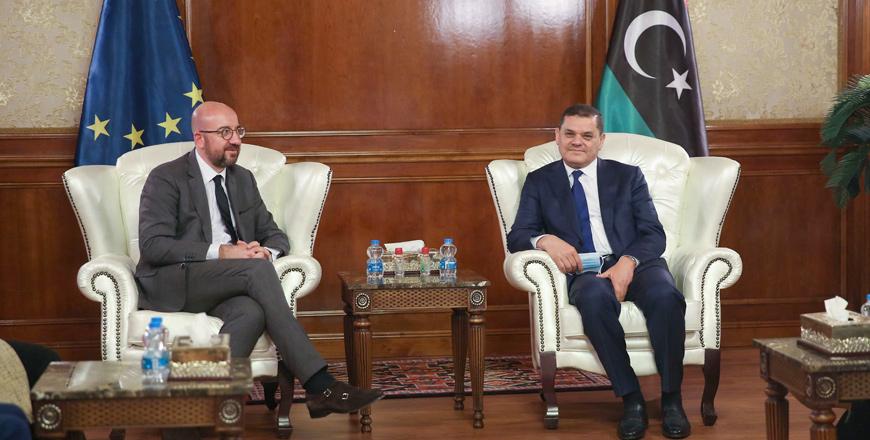- International News
- Mon-2021-04-05 | 03:41 pm

Nayrouz News Agency :
European Council President Charles Michel offered support to Libya Sunday on a visit to Tripoli, as the North African nation seeks to end a decade of chaos following a NATO-backed 2011 revolt.
"We will work with the new government and support it," Michel said after meeting with interim Prime Minister Abdul Hamid Dbeibah, who was selected in a UN-sponsored process to lead Libya to December 24 elections.
Libya's parliament confirmed Dbeibah's new transitional government last month.
"The European Union actively supports the process of national reconciliation," Michel said.
"Economic recovery, elections, the fight against illegal immigration... are areas in which the EU can help."
Oil-rich Libya has been torn by conflict since the toppling and killing of leader Muamer Qadhafi in 2011.
The latest unity government push is hoped to bring together rival forces, especially the two main camps in the east and west, each supported by foreign powers.
Some 20,000 mercenaries and foreign fighters remained in Libya in early December, according to the United Nations, and a January deadline for their withdrawal passed without any sign of them leaving.
Calls for them to depart have grown in recent weeks, and Michel urged "all mercenaries and foreign soldiers to quickly leave".
Foreign Minister Najla Al Mangoush Sunday repeated Libya's call for their withdrawal.
The country is also a major route for migrants trying to reach Europe across the Mediterranean, and traffickers have thrived in the lawlessness that followed Qadhafi's overthrow.
Michel said migration was a "major theme" in the relationship between Libya and the EU.
Last month, the foreign ministers of France, Germany and Italy visited Tripoli in a show of support for the war-torn country's newly formed government.
France reopened its embassy in Libya last month, and next week Greek Prime Minister Kyriakos Mitsotakis is expected to visit Tripoli to reopen the country's embassy there, in a visit coinciding with that of Italian Prime Minister Mario Draghi.
Michel said an EU ambassador would return to the Libyan capital in the coming weeks.
He also said the EU would donate 50,000 COVID-19 vaccines, which would add to the delivery earlier on Sunday of 100,000 doses of the Russian Sputnik V jab, the first batch to arrive.
Libyan authorities have officially reported over 160,000 cases of the coronavirus among its seven million population, with more than 2,700 dead.













